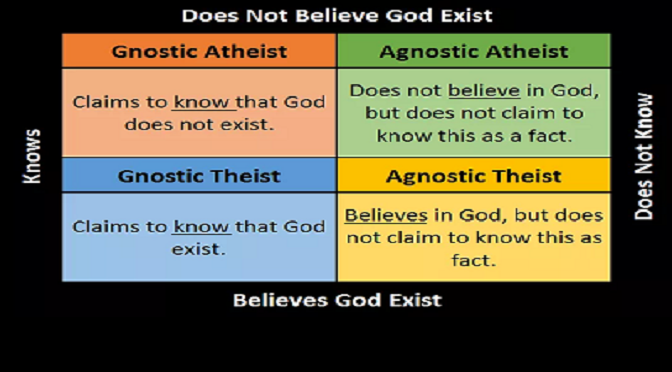This is one of the most common questions we receive on Freethought Forum (a public access TV show that I co-host.) Most people mistakenly think that an agnostic is a person halfway between a believer and a non-believer; i.e. that they are not sure whether they believe in a god or not? That’s not the case. Gnosticism doesn’t address beliefs. It addresses knowledge, or claimed knowledge. This is the definition that the Austin-Atheists use, and I concur.
Simply put:
* Theism speaks to belief: Theists believe in a god, atheists don’t.
* Gnosticism speaks to knowledge: Gnostics claim to have knowledge of a god, agnostics don’t.
You can be both at the same time. Personally, I’m an agnostic atheist, and most atheists are. We can’t KNOW for certain that there are no gods, of any type, anywhere, but we don’t BELIEVE in any.
There are:
* Hard (Gnostic) Atheists – People who claim that they know that a god does not exist, and can prove it through logical argument.
* Soft (Agnostic) Atheists – Claim that they don’t know (and indeed CAN’T know), and can’t prove it, but don’t believe in a god just the same.
Just as there are:
* Hard (Gnostic) Theists – Claim that they know that gods exist, and can prove it through logical argument.
* Soft (Agnostic) Theists – Claim that they don’t know (and indeed CAN’T know), and can’t prove that a god exist, but believe in a god just the same.
Atheists often identify themselves as Freethinkers, secularists, realists, rationalists, and/or secular humanists.
However, if you look up “atheist” in certain dictionaries you might encounter phrases like “one who denies the existence of God” (implying that we are in denial of reality), infidel, non-believer, immoral, or evil. After all, even dictionary compilers are human and subject to the same biases as regular authors. Good examples of this can be found in the older versions of Webster’s Dictionary. Webster was a Christian (theist) and obviously had an ax to grind against atheists.


Reply to your remark: You cannot be both agnostic and atheist at the same time, by definition of the terms, since the agnostic cannot know if God exists, and the atheist knows God does not exist.
Comments: Why do you not follow Pascal’s Wager? (My point is pragmatic, since Pascal’s Wager is not a valid argument for God’s existence.) If God exists, and you believe in him, then everlasting bliss is yours. If God does not exist, but you believe he does, then you die, disolve into nothingness, and nothing in life mattered.
NO, an Atheist does not KNOW that no gods exists (Theism and Atheism) address belief, not knowledge. Did you even read the article you’re commenting on, or just read the title, and jump to answer? I don’t KNOW(agnosticism) that there are any gods or not, but I don’t BELIEVE (atheism) in any.
As far as Pascal’s Wager is concerned. It’s more than just a false dichotomy. There are thousands of gods out there that people worship.. How do you know you ‘ve chosen the right one, or the right religion of that god, or the right sect of that religion? etc. etc.
Here is a video I did that shows just how flawed Pascals’ Wager is: https://www.youtube.com/watch?v=NMk2kHZUrAc
Theism or a-theism is a false dichotomy. Those 4 position models are a false dilemma.
For any claim: X, you can believe it’s true, believe it’s false, or have no belief either way.
Person A: belief X is true, no belief X is false
Person B: no belief X is true, no belief X is false
Person C: no belief X is true, belief X is false
There are 3 possible positions of belief/no-belief, regarding any claim. Dictating a single question, to only offer 2, is a false dichotomy.
Do you believe “gods exist”?
Do you believe “gods do not exist”?
YN: the-ist
NN: agnostic
NY: athe-ist
Do you believe “gods exist”?
Do you claim to know “gods exist”?
Do you believe “gods do not exist”?
Do you claim to know “gods do not exist”?
YYNN: theo-gnostic
YNNN: the-ist
NNNN: agnostic
NNYN: athe-ist
NNYY: atheo-gnostic
http://i.imgur.com/bIkjE99.jpg
I do believe that I covered all of those option in my article. Did you even read it?
Yep. You lumped two different positions together, by ignoring beliefs about the “gnostic atheist” claim “gods do not exist”. You presented a false dilemma.
Do you believe “gods exist”?
Do you claim to know “gods exist”?
Do you claim to know “gods do not exist”?
YYN: gnostic theist
YNN: agnostic theist
NNN: agnostic a-theist (this is agnostics and athe-ists tossed together)
NNY: gnostic a-theist
Huxley was a scientist, above all else. He saw the scientific method in picking apples at the market. The agnosticism he defined was a belief in that scientific method, and it amounted to a form of demarcation. No objective testable evidence = a subjective unfalsifiable claim. Results: unscientific and inconclusive. No belief as to the truth, or falsehood, of the claim. It is not compatible with athe-ism, the belief gods do not exist, or the-ism, the belief gods do exist.
“Agnosticism is of the essence of science, whether ancient or modern. It simply means that a man shall not say he knows or believes that which he has no scientific grounds for professing to know or believe.” ~ Thomas Huxley, 1884